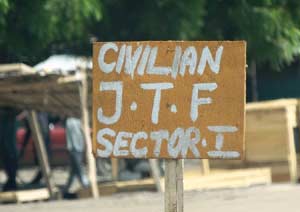It was a resounding endorsement of the gallant efforts of the Joint Task Force of the Nigerian military and security services implementing the emergency rule aimed at flushing out the Boko Haram and other terrorist groups scourging the North East and other parts of northern Nigeria.
[caption id="attachment_406693" align="alignright" width="300"]
 A sign near a checkpoint of a vigilante group reads Civilian J.T.F or Civilian Joint Task Force in Maiduguri,. Young men and women have in recent weeks formed vigilante groups, hunting down Boko Haram Islamists who have sneaked back into the city following a military offensive on their camps on the Nigerian border with Niger, Chad and Cameroon with remarkable success. AFP PHOTO[/caption]
A sign near a checkpoint of a vigilante group reads Civilian J.T.F or Civilian Joint Task Force in Maiduguri,. Young men and women have in recent weeks formed vigilante groups, hunting down Boko Haram Islamists who have sneaked back into the city following a military offensive on their camps on the Nigerian border with Niger, Chad and Cameroon with remarkable success. AFP PHOTO[/caption]Their emergence was particularly heartwarming, being a bold departure from the tendency of misguided elements who have sought to portray the terrorists as fighters for a particular religion and region. The “Civilian JTF” recognised the danger and damage to the economic and social livelihood of the people wrought by the al Qaeda-inspired terrorists and decided to assist our men and women under arms to bring the insurgency to an early end.
The situation, however, started taking a different turn when the much wounded and paralysed terror networks started targeting the “Civilian JTF” and their relations for elimination, thus forcing some members of the patriotic vigilantes to take up arms and fight back. Media accounts had it that a contingent of the “Civilian JTF” attacked Boko Haram members at Dawashi village in Kukawa Local Government Area of Borno State, a venture that ended in the death of not less than 25 civilians.
We make haste to caution that law abiding civilians should not be allowed to take arms and join the fight against terrorists. That aspect must be left to the JTF soldiers to handle because they are professionally trained, equipped and mandated to do so. There are clear evidences that they have carried out their mandate effectively and are moving towards breaking the backbone of the terrorists.
The civilians must not join in the military fray. They must stay away from harm’s way. The job of a vigilante in such high-risk security operation is to provide information and extend total cooperation to the military people.
Apart from risking their lives unnecessarily, a greater danger of exposing civilians to battle situations includes the possibility of some of these civilians turning into warlords. In the North, such warlords inevitably put on the religious garb. Before we know it, civilians helping to fight terrorists may fall under the influence of politicians and other foreign sponsors to float their own terror outfits.
We must avoid this at all costs. We call on the “Civilian JTF” not to lose heart but to intensify their efforts to assist the military to victory. As youth, helping to win the war means they will claim a place of pride when the rebuilding process begins.
